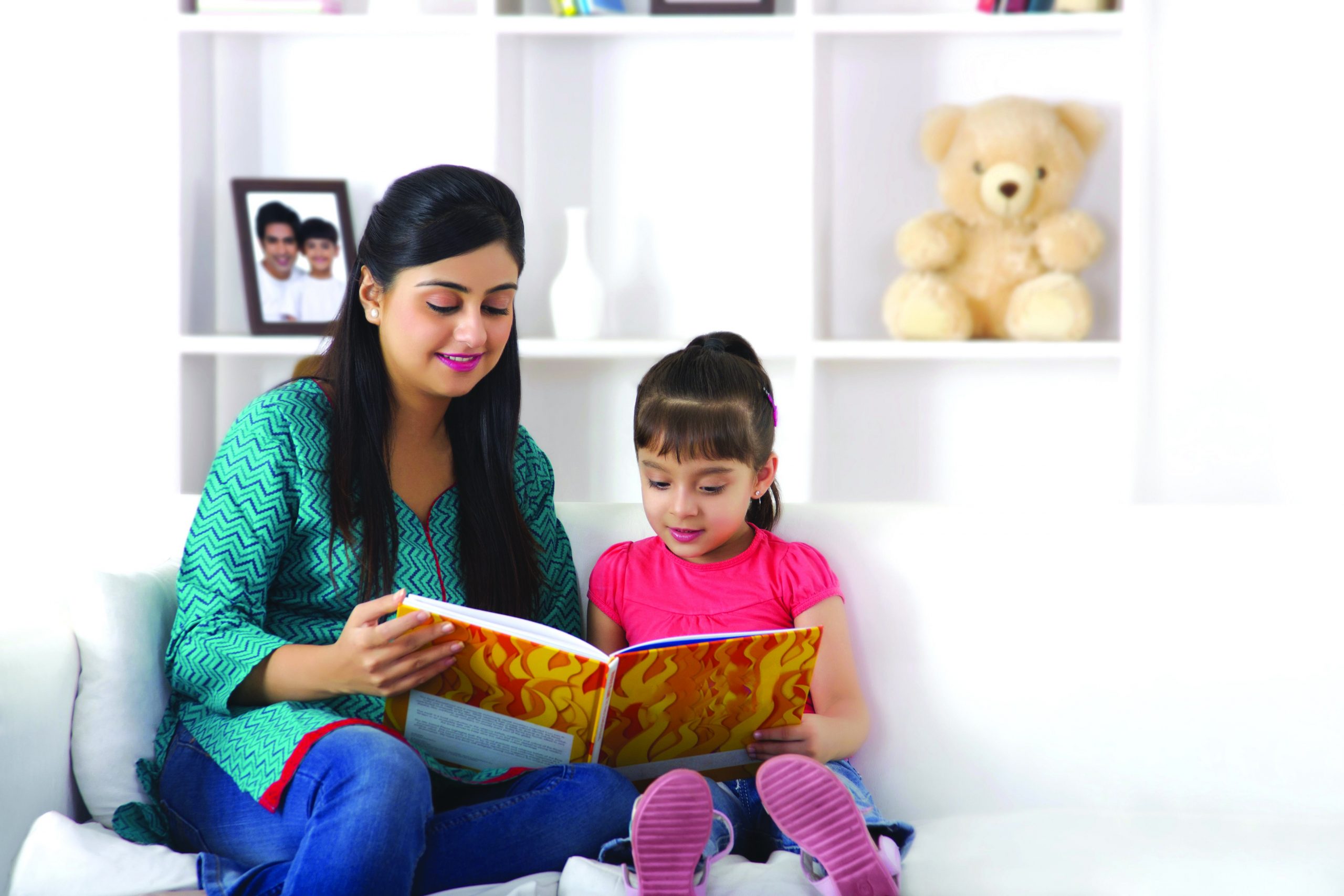Character building in Covid-19 Era
ParentsWorld presents expert advice on ways and means parents can build four important character traits of children — respect, integrity, resilience and responsibility — virtues which have corroded in the pandemic era, writes Aurelin Ruth, Cynthia John, Mini P.

Jaspreet Singh, a Bengaluru-based IT consultant and father of a four-year-old, smiles unapologetically, after helping his son write an online spelling test.
This is the new normal. How do they expect a four-year-old child to know the spelling of ‘crocodile’? He has attended only online classes all of last year and has learnt little. Online learning has proved impersonal and ineffective,” he says.
This scene is playing out in millions of homes across India where the deadly Covid-19 pandemic, which has infected 30.9 million citizens and claimed 409,000 lives countrywide, has engendered the new phenomenon of home-based online learning. With schools in India shut for 57 weeks — the lengthiest closure of any country worldwide —children are learning and writing tests digitally from their homes and succumbing in droves to the temptation to cheat. Social media and newspapers are abuzz with teachers flagging incidents of school children and college youth cheating in online exams with amoral parents turning a blind eye, if not aiding and abetting.
Nor is cheating and examinations malpractice restricted to K-12 education. Last November, several IITs and Central government universities reported an alarming increase in cheating during online exams with students forming WhatsApp groups to collaborate on Smartphones and surfing the Internet on a shared device. The Union education ministry was forced to step in and constitute a ten-member committee to “develop a common protocol for online internal examinations” in centrally-funded education institutions for ensuring the “security and sanctity” of exams.
The pandemic-prompted surge in online cheating has provoked an anguished debate among educators and parents communities about the importance of building the character of the country’s children. It’s gradually becoming very apparent that damage to lives and livelihoods apart, the pandemic has severely impacted children’s mental equilibrium because they have suddenly isolated from friends and extended family members and school routines that helped them thrive in the past. With Covid positivity rates and fatalities showing a downward trend and return to pre-pandemic normalcy around the corner, educators and child development experts believe this is an appropriate time for parents and teachers to step and provide children the socio-emotional support to develop character and ethical values.
“The pandemic has impacted children’s social mores and mental health more than we can imagine. Children, who once were honest in their schoolwork, have taken to routinely cheating in online exams. Children who rarely lied to parents, now do it more often. Months of social isolation and closure of schools — where character is built and reinforced — lack of teacher guidance and peer role models have forced them into ‘casual criminality’. Instead of imposing punishment, we need to be kind to them and gently redevelop their character and self-esteem. We need to restore their confidence, courage and self-respect to nurture compassionate and socially responsible citizens,” says Jayalakshmi Vaidyanathan, a Bengaluru-based life skills trainer who conducts social and emotional development workshops for adults and children.

Renuka Kaimal, a Bengaluru-based senior projects manager in an IT company and mother of two daughters, concurs. “The pandemic has suddenly thrown children into unpredictable situations and difficult dilemmas. They are responding in different ways — some honestly, some not so honestly. Moreover, locked indoors with digital devices 24×7 has made them moody, irritated and often disrespectful towards their parents. We need to interpret the pandemic as a God-sent opportunity to build character traits such as integrity and mental endurance within our children. Schools are focusing too much on academics during online classes, they need to also pay attention to character education which is the foundation of all learning,” says Kaimal.
In the pages following, ParentsWorld presents expert advice on ways and means parents can build four important character traits of children — respect, integrity resilience and responsibility — virtues which have corroded in the pandemic era.
The six pillars of Character

TRUSTWORTHINESS
- Be honest. Don’t deceive, cheat or steal.
- Be reliable. Do what you say you’ll do.
- Have the courage to do the right thing.
- Build a good reputation.
- Be loyal. Stand by your family, friends and country
RESPECT

- Treat others with respect. Follow the Golden Rule.
- Be tolerant of differences.
- Use good manners, not bad language.
- Be considerate of the feelings of others.
- Don’t threaten, hit or hurt anyone.
- Deal peacefully with anger, insults and disagreements.
FAIRNESS

- Play by the rules.
- Take turns and share.
- Be open minded. Listen to others
- Don’t take advantage of others.
- Don’t blame others carelessly.
RESPONSIBILITY

- Do what you are supposed to do.
- Persevere. Keep on trying.
- Always do your best.
- Use self-control. Be self-disciplined.
- Think before you act. Consider the consequences.
- Be accountable for your choices.
CARING

- Be kind.
- Be compassionate and show you care.
- Express gratitude.
- Forgive others.
- Help people in need.
CITIZENSHIP

- Do your share to make your school and community better.
- Cooperate.
- Stay informed. Vote.
- Be a good neighbour.
- Obey laws and rules. Respect authority.
- Protect the environment. Recycle.
Source: charactercounts.org
RESPECT
Respect — admiration for other people’s capabilities, qualities and achievements — is a character trait parents and teachers need to inculcate in children from early childhood. With the pandemic lockdown having isolated children and restricting social interaction, respect for traditional authority figures is waning.
For instance, over the past year, teachers have reported thousands of incidents of students bullying and badmouthing teachers on social media. Home confinement 24×7 with parents and extended family members is also driving children, especially adolescents, over the edge, increasingly prompting them to vent their anger and frustration on hapless parents.

“Over the past year, a rising number of parents are reporting unprecedented conflicts with teenage children. Forced confinement of physically active teens in their homes under 24/7 parental supervision causes intense irritation and anxiety within adolescents who are increasingly venting their frustration by turning on parents and family members,” says Rajat Soni, a New Delhi-based teen-life and parenting coach.
Re-inculcating traditional norms of respect for elders and authority within children will take time, patience and exemplary parental behaviour. “If you want children to become respectful, parents need to role model respectfulness in all communication and attitudes. Self-awareness, choosing words carefully and empathetic listening are important for role modeling respect and appreciation of others. Sometimes parents under stress may yell at colleagues. Earlier, these situations were confined mostly to the office but now children are witnessing all office communications at home. Parents need to model respectfulness in their official and personal interactions to enable children to develop this all-important character trait,” advises Soni.
RESILIENCE
Resilience is ability to cope with crises and to quickly recover from adversities. The deadly Covid-19 pandemic with all its repercussions has caused huge emotional angst and anxiety in children and adolescents struggling with the consequences of parental job losses, deaths of family members, education disruption and prolonged home confinement. While a resilient minority is coping, millions are wilting under the weight of grief and depression. With a new age of pandemics having dawned and new variants of old viruses around the corner, it’s important for educators and teachers to teach children to become more resilient and develop coping capabilities.
 “Varied experiences, some easy, some difficult are part of life. Resilience is capability to bounce back from difficult experiences. It requires the properties of elastic. When we experience setbacks, resilience gets us back to normal,” says Jayalakshmi Vaidyanathan, a Bengaluru-based life skills trainer, quoted earlier.
“Varied experiences, some easy, some difficult are part of life. Resilience is capability to bounce back from difficult experiences. It requires the properties of elastic. When we experience setbacks, resilience gets us back to normal,” says Jayalakshmi Vaidyanathan, a Bengaluru-based life skills trainer, quoted earlier.
Vaidyanathan believes qualities of resilience can be developed in children. “The pandemic has resurrected the teaching role of parents. By narrating stories of people who have successfully overcome great difficulties and challenges, and by working towards solving problems rather than moaning about adversities, parents can teach children the virtues of resilience and building coping mechanisms. Every problem has a solution, often more than one,” advises Vaidyanathan.
INTEGRITY
With a new wave of fudging and cheating sweeping across the country in the new era of online tests and exams, this is a good opportunity for educators and parents to teach children the cost-benefits of integrity, honesty and self-discipline.

“Mass copying and cheating in board exams, especially in the northern badland states of Bihar and Uttar Pradesh, have given India a notorious global reputation. This situation has gone from bad to worse in the new era of online tests and examinations. A large and growing number of foolish parents, instead of reprimanding cheating children, are aiding and abetting them, raising serious questions about parenting practices, integrity and character development. This is a good time for parents to understand that because of widely prevalent malpractices in board exams, school-leaving certificates have become highly devalued and college and higher education entrance exams are becoming more difficult as are corporate and UPSC exams and interviews. In the circumstances, children who cheat and fudge their way through school and college are certain to be exposed and become unemployable. Therefore, this is a good time for parents to teach children that learning honesty is the best policy,” says Dr. Pallavi Rao Chaturvedi, a Bhopal-based parenting coach who anchors the popular ‘Get Set Parent with Pallavi’ YouTube channel, and is also vice president of the Early Childhood Association of India, which has a nationwide membership of 38,000 preschools.
RESPONSIBILITY
According to the US-based The Centre for Parenting Education, the most preferred character trait that parents would like their children to develop is sense of responsibility. The centre defines responsibility as “being dependable, keeping one’s word and agreements, meeting one’s commitments, doing something to the best of one’s ability, being accountable for one’s behavior, accepting credit when you do things right and acknowledging mistakes, and being a contributing member of one’s family, community and society”.

Back in India, i.e, Bharat, during the 15-month pandemic lockdown, social media posts are awash with parents complaining about children having become lazy and irresponsible and digitally addicted. “Children worldwide are experiencing anxiety, stress and loneliness because of the Covid pandemic. They need to be reassured and counseled to become responsible. There are several simple ways in which parents can teach children responsibility. For instance, by assigning children to do household chores and teaching them to share their family’s workload (see box). Praising children when they complete a task and by explaining the consequences of irresponsibility and selfishness. Moreover, parents need to explain why accepting and discharging responsibility builds character and earns societal respect,” says Anitha Bennett, Chennai-based writer of children’s books, who also conducts character-building and life skills workshops for children and adults.

Build your child’s Character
Parents are a child’s first teacher and have an obligation and numerous opportunities to build their character, says Anitha Bennett, a Chennai-based writer of children’s books, who conducts reading and discussion workshops on character-building and life skills. In her workshops, she invariably recommends a 5-point plan to build children’s character to enable them to grow into socially responsible citizens invested with integrity and compassion.
- Teach your child to make informed choices. Refer to books and real-life examples to explain the importance of well-informed choices.
- Acknowledge and compliment displays of good character and behaviour. If your child’s friend greets you politely, reciprocate the greeting with greater politeness. Children learn best by example.
- Practicing good manners should be part of the family’s daily routine. Commonplace words such as please, thank you, and sorry, should be used in conversations with children and adults. Conversely, don’t use bad or impolite language.
- When discussing and evaluating friends and acquaintances, focus on character rather than academic and commercial achievements. Reward virtues such as integrity, diligence and perseverance rather than mere academic achievement.
- Acknowledge good role models by narrating/reading out stories/biographies of positive character role models in history (Mahatma Gandhi), literature, science and the arts.
Involvement in Daily Chores
Managing household and office work, socialising and multi-tasking can drain your energy. Involving children in daily chores lessens parents workload and builds children’s character in several ways.
- It enables children to learn essential skills such as cooking, cleaning, washing and ways and means to discharge them responsibly
- Such involvement builds children’s self-esteem by making them aware that they are contributing
- It facilitates family bonding
- It teaches the virtues and benefits of cooperation
It’s never too early to get children involved in helping out with household chores. Even 18 months-olds can learn to put away their toys in their boxes.
Establish routines
Children love guidance. Linking chores to outcomes can turn chores into habits. For example, get your child to clear up the study table and put her stationery in place immediately after completing her homework.
Even youngest children can straighten their pillows and keep bed sheets in a corner if they aren’t old enough to fold them. A tidy room usually results in a tidy mind.
Cooperation
There’s no need to divide chores equally. Let children choose chores they like to do. If there are chores no one wants to do, incentivise them.
Weekly tasks
If there are tasks that need to be done periodically such as dusting, cleaning cupboards and desks, get a consensus to schedule them for a particular day of the week, say Saturday evening. In those 15-30 minutes, all members of the family should diligently discharge their duties in a cheerful and joyous way, livened with music.
Also Read: Nurturing children’s entrepreneurship skills

















Add comment